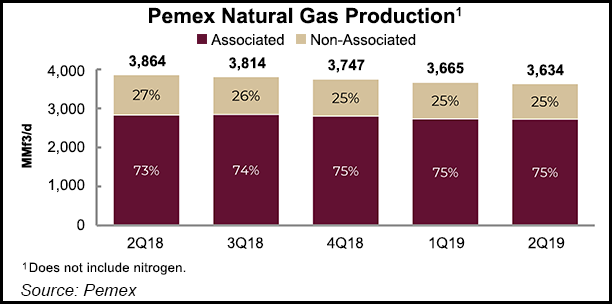E&P | NGI All News Access | NGI The Weekly Gas Market Report
Natural Gas Output From Mexico Energy Reform Contracts Seen Doubling By 2021
Mexico’s upstream oil and gas regulator, Comisión Nacional de Hidrocarburos (CNH), expects natural gas production from contracts awarded through the country’s 2013 energy reform to reach 464 MMcf/d by 2021, more than double the 225 MMcf/d expected from the same contracts in 2019.

CNH’s Fausto Ãlvarez Hernández, head of the technical administrative unit for assignations and contracts, said in a presentation Tuesday that projects awarded via the Round 1.2 tender in 2015, along with migrated oilfield services (OFS) contracts at acreage held by state oil company Petróleos Mexicanos (Pemex), are expected to be the main drivers of output in 2021.
Projects awarded in subsequent rounds 1.3 and 2.1 will also contribute, as will the assignations awarded to Pemex under the Round 0 process in 2014, through which CNH gave Pemex the rights to explore and develop 83% of the country’s 2P (proved plus probable) reserves.
Crude oil production from the energy reform contracts is expected to triple over the same span to 303,900 b/d, up from 106,800 b/d forecast by end-2019.
Ãlvarez said that as of June 2019, the energy reform contracts accounted for 72,100 b/d of Mexico’s 1.665 million b/d of total oil production.
Migrated OFS contracts at Pemex-operated areas supplied 40,200 b/d, followed by migrated OFS contracts at non-Pemex-operated areas at 16,600 b/d. Pemex farmouts supplied 10,800 b/d, followed by 4,500 b/d from purely private sector-operated areas.
Ãlvarez said that while the latter figure may not sound like much, it is up from around 1,800 b/d two years ago.
In other words, private sector firms have more than doubled their oil output over a span in which Pemex production fell by more than 3%.
CNH said last week that as a result of the 111 energy reform contracts currently in effect, the Mexican government took in 5.7 billion pesos, or about $287 million, during the first half of 2019, up 69% year-on-year.
In a recent presentation, CNH commissioner Sergio Pimentel said that the government take for these contracts averages between 72-74%, in line with other jurisdictions around the world.
Since taking office last December, President Andrés Manuel López Obrador has suspended bid rounds and Pemex farmout tenders indefinitely, saying that they have failed to show results.
He has instead tasked Pemex with single handedly reversing a 15-year trend of declining crude oil output.
Pemex’s 2019-2023 business plan calls for crude oil production of 2.7 million b/d by 2024, a 1 million b/d increase from current levels.
CNH on Tuesday approved two development plans submitted by national oil company Pemex for the Teekit and Cibix projects.
With Teekit and Cibix, Pemex has now obtained regulatory approval for 12 of the 20 fields it has identified as high-priority to turn around production.
The 12 projects approved so far are expected to reach combined peak output of 235,000 b/d of oil and 797 MMcf/d of natural gas, CNH said.
Investment in the projects will total an estimated $6.432bn, and will include the drilling of 97 wells.
The Teekit shallow water field is located about 14 miles northeast of Dos Bocas, Tabasco state, where Pemex is building a 340,000 b/d refinery.
The Cibix onshore field is located about 19 miles outside of Villahermosa, Tabasco.
© 2024 Natural Gas Intelligence. All rights reserved.
ISSN © 2577-9877 | ISSN © 2577-9966 | ISSN © 1532-1266 |
